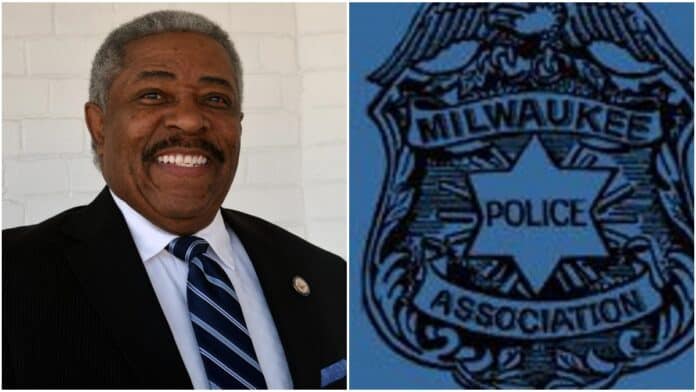The Milwaukee Police Association has filed a lengthy ethics complaint against Milwaukee City Attorney Tearman Spencer, citing the harassment allegations against him and accusing him of failing to represent his clients, Milwaukee police officers, in the Sterling Brown case. In addition, the union says Spencer’s bad legal advice resulted in the overturned demotion of former Police Chief Alfonso Morales.
“Within the first year of his four-year term, City Attorney Tearman Spencer has engaged in numerous ethical, legal and moral violations,” the complaint, obtained by Wisconsin Right Now, says. It alleges multiple violations of Supreme Court rules. There are nearly 300 female sworn members of the MPD but the union wrote that it would never want another woman to have to risk working for Spencer.
The MPA filed the complaint with the Office of Lawyer Regulation. It cites a Wisconsin Right Now article in one place in which Spencer discussed the Brown case with a constituent in a series of Facebook messages. The complaint also raises questions about Spencer’s failure to file campaign finance reports, a deputy city attorney’s alleged conflict of interest involving MPD-related cases, his dismissal of curfew tickets, his comments against law enforcement, and the way he perceives the role of his office.
The MPA is the union representing rank-and-file Milwaukee police officers. Spencer was elected city attorney a year ago, ousting long-time, respected City Attorney Grant Langley. Since then, he’s faced a series of allegations, most recently claims that he harassed multiple female staffers. We also left a message with the city attorney’s office giving Spencer a chance to respond to the complaint.
The city basically tried to wash its hands of those claims, taking no significant action to protect the employees, by writing that its anti-harassment policies don’t cover elected officials. We previously reached out to multiple women’s groups for comment, and they were silent. The MPA is being anything but silent.
“For us, this is not about political pressure. It is about ethics and it is about standing up for what is right. We will not succumb to the deafening silence of those at City Hall who refuse to speak up out of cowardice,” wrote the union on the harassment allegations against Spencer.
“The City Attorney is one of the most powerful and important positions in the entire City of Milwaukee. Accordingly, the incumbent of that position must be held to the highest ethical and legal standards,” wrote MPA President Dale Bormann Jr. in the complaint. “We believe Mr. Spencer’s actions have been grossly unethical and merit immediate investigation. His ongoing, publicly reported violations – both directly involving the MPA and indirectly involving us – have come to a head and MPA must now resort to filing this complaint.”
The police union wrote that it had no initial opinion of Spencer because, before he campaigned to be city attorney, the union had “never heard of him.”
The union said it decided to file the complaint after the harassment allegations, but it was contemplated before that point, noting that “Mr. Spencer is a public figure whose public and private actions have cost the City of Milwaukee incalculable damages.” The union said it was making the complaint public to inform the public of “the breadth of ethical violations.”
Many people are staying silent “presumably out of fear of retaliation,” wrote Bormann.
Here are the complaint’s main allegations:
That He Misunderstands the City Attorney’s Role
That he fundamentally misunderstands the role of the City Attorney. He claims on his website that he represents the “people of Milwaukee” and is “fighting for the people of Milwaukee.”
But, says the union, a city attorney is “not a voice for the voiceless people of Milwaukee. To the contrary, the city attorney often represents the City of Milwaukee’s interests against members of the public.”
The City’s website says the city attorney’s client is the legal entity of the city of Milwaukee. This is a problem because millions of dollars and police officers’ careers are at stake from lawsuits that the city attorney responds to.
That Spencer Did Not Properly Represent His Clients, Milwaukee Police Officers, in the Sterling Brown Settlement
The complaint alleges he made “representations against the interest of his client” in the Sterling Brown case.
Six of the eight officers involved in the 2018 arrest of Sterling Brown are current members of the MPA or Milwaukee Police Supervisors Organization. Brown filed a civil lawsuit, and those officers are also named parties in it and are supposed to be represented by the City Attorney in the case.
In early 2020, the parties were close to reaching a settlement. But the matter wasn’t resolved; then, former Chief Alfonso Morales was given unprecedented and “arguably illegal” directives from the Fire and Police Commission.
The complaint claims that Spencer gave Morales “one week” to resolve the Sterling Brown case “with a dramatically different and considerably more generous settlement proposal than what was previously presented.” The complaint alleges Spencer used the pressure Morales was under “to try to force a settlement against the interest of his clients.”
Morales resisted and there was no settlement until it was reported in multiple media that it had been settled in November 2020.
The “so-called settlement moved forward without the City Attorney contacting or advising his clients – including the eight current or former officers personally named in the lawsuit,” the complaint says.
Spencer told the Milwaukee Journal Sentinel that Spencer “said he did not know what police or their representatives thought of the proposed settlement.”
The union stresses that the officers “Mr. Spencer ‘didn’t think he needed to keep involved’ are named defendants that he represents in the lawsuit.”
The complaint also cites a Wisconsin Right Now article into Facebook messages Spencer wrote to a constituent, privately discussing this “active and ongoing case” and reiterating “his gross indifference to his clients’ rights, stating, ‘the Sterling Brown matter is more for the people.’”
The settlement remained open because Spencer’s deputy and assistant city attorneys stepped in, claims the union.
Bormann said he overheard Spencer having a conversation on the phone while they were waiting in line for COVID testing.
He said, “I don’t care what the police chief says about this. I also don’t care what the union has to say about this,” the complaint alleges. Bormann figured out the conversation was about the Sterling Brown settlement.
“At this point, the sergeants and officers that were involved in this case did not know anything about this settlement,” the complaint says, noting the proposed amount was $750,000.
The proposed settlement also involved the police department “admitting to constitutional violations.” It could have opened the officers up to additional discipline or possible termination. On Nov. 14, 2020, both unions signed a letter citing Spencer’s “dereliction of duty.”
Six days later, an assistant city attorney sent out an email to the officers involved in the case and set up a meeting to discuss the case with them. The union doesn’t think this would have happened without its public pressure. The complaint cites six Supreme Court Rules violations, including competence, communication, confidentiality, and misconduct.
Criticism Against Law Enforcement
Spencer ran a campaign openly critical of the MPD, and “those viewpoints have continued to saturate his comments despite the fact that the police department is one of his primary clients,” the union writes.
Spencer said that “everyone deserves a vigorous defense, but it doesn’t have to come from this office” if there is a “bad actor” on the police force, says the complaint.
Curfew citations
In response to the 2020 civil unrest “which included riotous and very violent behavior (including a Milwaukee Police Department officer being shot), the Mayor implemented a curfew.” That was issued under the guidance of the City Attorney and numerous citations for violation of curfew were issued by the Milwaukee Police Department.
However, in response to public criticism, Spencer and U.S. Rep. Gwen Moore held a press conference asserting he would be “dismissing many (if not all) citations.” He made this assertion despite his client, Morales, objecting to the press conference, writes the union, adding, “He reiterated that he represents the ‘voiceless.'”
Harassment Claims
The complaint cites the city report alleging that Spencer harassed female staffers, including putting his hand on one woman’s knee and commenting on another’s “very nice calves.” He allegedly called a female assistant attorney “sweetheart.” He also allegedly asked male attorneys how tall they were and said the question was “only for the men.”
He allegedly told another female assistant city attorney that she was “too smiley” and quiet and he envisioned a big and tough person staffing an assignment and told a woman she had “very nice calves.”
Spencer also allegedly commented that “women like to be fashionably late” and “women need to be reminded sometimes” while waiting for someone to join a conference call.
He tried to block release of the report and called the allegations “fabricated stories” by people upset he was the new city attorney. In the Journal Sentinel, when asked if he would promise not to retaliate, Spencer said he does not make promises adding, “I’m not one to retaliate.”
In a “disturbing radio show” appearance on FM 101.7, Spencer chastised a number of clients including the Department of Neighborhood Services and Employee Relations and criticized two elected officials and his former human resources employee. “He misrepresents information about his staff and the law releasing the report,” and he made a “gross misunderstanding of attorney-client privilege,” claims the union.
He took an “offensive jab at both victims and law enforcement.”
“He repeatedly victim blames the employees who spoke out about their allegations of sexual harassment, no doubt perpetuating the environment of fear of retaliation.”
He then went on Outlaw Radio and said the accusers “manipulate(d) and use(d) the system” and said the comment on a woman’s legs was “with a distinctly different fact pattern than the ‘calves’ comment cited in the report,” says the complaint.
Allowing Conflicts of Interest to Occur with a Newly Hired Deputy City Attorney
One of Spencer’s newly appointed deputy city attorneys had 45 open cases in which he was the attorney of record for mostly criminal cases, some of which involved MPD investigations, while the deputy city attorney was assigned to oversee the unit that prosecutes municipal citations on behalf of the MPD, according to the complaint.
“The business did not wind down and that deputy city attorney continued to make new notices of appearances and advertise for services. It was also reported that he was doing this on the city’s payroll, which Mr. Spencer has denied,” says the complaint.
Legal Advice During ‘Demotion’ of Chief Alfonso Morales
There was fingerpointing between the FPC and Spencer as to who is to blame “for the improper due process” received by Morales.
The city’s Inspector General Ronda Kohlheim found that “on at least two occasions the Board’s decision to demote the chief was exclusively based on an apparent assertion by the City Attorney ‘to do what needs to be done.’”
FPC Chairman Nelson Soler told the Journal Sentinel he felt the report failed to take into account the full involvement of the City Attorney’s office in the decisions made on this matter, including the decision to demote Morales.”
Spencer hired an attorney Nate Cade who has had a series of cases against the MPD.
“Mr. Spencer’s inaccurate advice has contributed substantially to the still unresolved lawsuit with former Chief Morales,” says the complaint.
Failure to Lawfully Report Campaign Finances
Spencer failed to file both his 2021 January Continuing Campaign Finance Report and his 2020 Pre-Election Report.
That case was referred to the state Ethics Commission. The executive director of the City of Milwaukee’s Election Commission said that the campaign was “not responsive” and the report was filled with errors “which we have also communicated without resolution.”
Spencer’s campaign bookkeeper said she had been sick and has a backlog of projects.
The MPA wrote that without knowing where the money is coming from “it is impossible to fully gauge our lawyer’s potential conflicts of interest.”
The reports were still not filed as of the second week of April.
Table of Contents












![WATCH: Elon Musk Town Hall Rally in Green Bay [FULL Video]](https://www.wisconsinrightnow.com/wp-content/uploads/2022/04/Elon_Musk_3018710552-218x150.jpg)



![The Great American Company [Up Against the Wall]](https://www.wisconsinrightnow.com/wp-content/uploads/2025/03/MixCollage-29-Mar-2025-09-08-PM-4504-218x150.jpg)
![The Wisconsin DOJ’s ‘Unlawful’ Lawman [WRN Voices] josh kaul](https://www.wisconsinrightnow.com/wp-content/uploads/2025/03/MixCollage-29-Mar-2025-08-48-PM-2468-218x150.jpg)



![Judges vs. Trump [Up Against the Wall] Frederick Walls Trump Holds Cash Special Counsel Jack Smith Iowa Victory for Trump Remove Trump From Primary Ballot](https://www.wisconsinrightnow.com/wp-content/uploads/2023/11/trump-case-dismissed-218x150.jpg)
![The Fed Reverses Course [Up Against the Wall] the fed](https://www.wisconsinrightnow.com/wp-content/uploads/2023/07/Collage-Maker-20-Jul-2023-08-12-AM-729-218x150.jpg)
